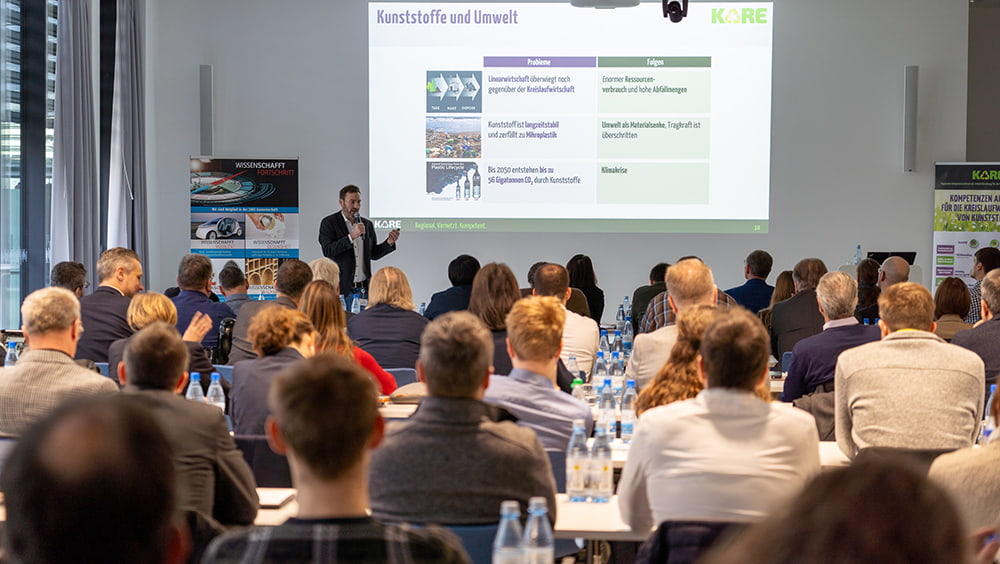Shaping the future: the plastics industry in and around Franconia is embracing the circular economy
The KARE competence center invited guests to an initial network meeting on December 5, 2024. Under the motto “What must modern work design achieve for the transformation of the plastics industry?”, over 100 stakeholders from the plastics industry, politics and society came together at the SKZ Plastics Center model factory in Würzburg to exchange ideas on the latest developments and challenges in the circular economy.

First network meeting of the KARE competence center in the SKZ model factory. (Photo: Luca Hoffmannbeck, SKZ)
First network meeting of the KARE competence center in Würzburg inspires
In his personal welcome address, SKZ Chairman Prof. Dr.-Ing. Martin Bastian emphasized the central role of the circular economy for the future of the plastics industry. Dr. Anja Weisgerber, member of the German Bundestag, also warmly greeted the participants, this time via video message from Berlin. Dr. Weisgerber is convinced: “A circular economy can only succeed through cooperation along the value chain. Only if all players, from management to skilled workers, realize that they can actively participate in shaping it, can we create meaningful work that becomes more attractive.” She supports the unique bundling of expertise from practice and research in and around Franconia. In his keynote address, Dr. Hermann Achenbach, project initiator of KARE and head of sustainability and circular economy at SKZ, provided a comprehensive insight into the activities and benefits of the competence center. He emphasized the importance of resource conservation and the achievement of climate targets as central aspects of the circular economy.
Frank Stammer from TecPart – Verband Technische Kunststoff-Produkte e.V. presented initial observations and results from the KARE consortium in his keynote speech. He highlighted the status quo of the German plastics industry, the dynamic developments in the regulatory framework and the resulting competence requirements for employees.
Circular economy as an opportunity for the plastics industry
A panel discussion with Martin Bastian, Andreas Jenne (Sustainability Officer, Rehau Industries SE & Co. KG), Christine Haupt-Kreutzer (Deputy District Administrator, Würzburg District) and Holger Kempf (Representative of IG BCE, Main-Franconia District) rounded off the morning program. The panelists discussed the role of modern work design in the circular economy and agreed that, in addition to the challenges that need to be overcome, it also offers decisive opportunities for the plastics industry. “It's not the consumer's job, but the industry's,” Andreas Jenne appealed. “Companies must actively and jointly shape the transformation to a circular economy.” Many of those present took this momentum from the event back to their companies.
During the joint lunch break and the subsequent workshops, the participants had plenty of opportunities for networking and an active exchange. The workshops covered topics such as measures to secure a skilled workforce, the obligations and opportunities of sustainability reporting, and challenges and solutions in internal workflows. The valuable input from the participants will help to further develop sustainable and effective work processes. The networking activities also opened up new opportunities for cooperation. The interest of many participating companies in becoming associated partners increases the visibility and expands the sphere of influence of the KARE competence center.
About KARE:
The research project KARE “Kompetenzzentrum der Arbeitsforschung KARE: Kompetenzen Aufbauen für die Kreislaufwirtschaft von Kunststoffen” is funded by the Federal Ministry of Education and Research (BMBF) in the program “Zukunft der Wertschöpfung – Forschung zu Produktion, Dienstleistung und Arbeit” (funding code: 02L22C200) and supervised by the Project Management Agency Karlsruhe (PTKA). The authors are responsible for the content of this publication.


